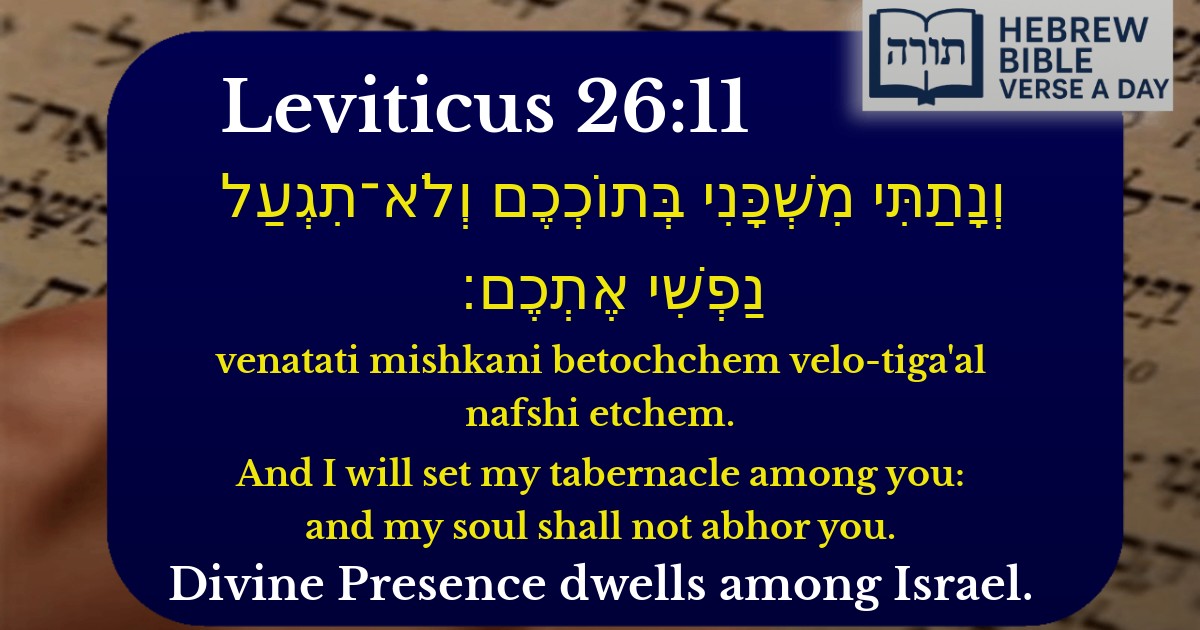Join Our Newsletter To Be Informed When New Videos Are Posted
Join the thousands of fellow Studends who rely on our videos to learn how to read the bible in Hebrew for free!
Hebrew Text
וְנָתַתִּי מִשְׁכָּנִי בְּתוֹכְכֶם וְלֹא־תִגְעַל נַפְשִׁי אֶתְכֶם׃
English Translation
And I will set my tabernacle among you: and my soul shall not abhor you.
Transliteration
Venatati mishkani betochchem velo-tiga'al nafshi etchem.
Hebrew Leining Text
וְנָתַתִּ֥י מִשְׁכָּנִ֖י בְּתוֹכְכֶ֑ם וְלֹֽא־תִגְעַ֥ל נַפְשִׁ֖י אֶתְכֶֽם׃
וְנָתַתִּ֥י מִשְׁכָּנִ֖י בְּתוֹכְכֶ֑ם וְלֹֽא־תִגְעַ֥ל נַפְשִׁ֖י אֶתְכֶֽם׃
🎵 Listen to leining
Parasha Commentary
📚 Talmud Citations
This verse is quoted in the Talmud.
📖 Yoma 56b
The verse is referenced in a discussion about the Divine Presence dwelling among Israel and the conditions for its continued presence.
📖 Megillah 29a
The verse is cited in the context of discussing the presence of the Shekhinah (Divine Presence) in the synagogues and study halls of the diaspora.


Verse Context (Vayikra 26:11)
This verse appears in the Torah portion of Bechukotai (Vayikra 26:3-46), where Hashem outlines the blessings for observing His commandments and the consequences for neglecting them. The promise of "I will set My tabernacle among you" follows the description of material blessings, indicating a deeper spiritual reward for faithfulness.
Meaning of "Mishkani" (My Tabernacle)
Rashi explains that "מִשְׁכָּנִי" refers to the Shechinah (Divine Presence) dwelling among Bnei Yisrael. This is not merely a physical structure but a manifestation of Hashem's closeness to His people when they follow His ways. The Sforno adds that this promise was initially fulfilled with the Mishkan in the wilderness and later with the Beit HaMikdash in Yerushalayim.
"My Soul Shall Not Abhor You"
The second half of the verse assures that even when Bnei Yisrael stumble, Hashem will not utterly reject them. The Ramban notes that this reflects the eternal covenant between Hashem and His people—while there may be consequences for sin, the relationship is never fully severed. The term "תִגְעַל" (abhor) is strong language, emphasizing that despite human failings, divine rejection is not absolute.
Midrashic Insights
Halachic and Philosophical Implications
The Rambam (Hilchot Teshuvah 7:6) derives from this verse that sincere repentance will always be accepted, as Hashem's presence remains accessible to those who return to Him. The Kli Yakar emphasizes that the indwelling of the Shechinah is tied to Torah study and mitzvah observance, making them the foundation of divine closeness.